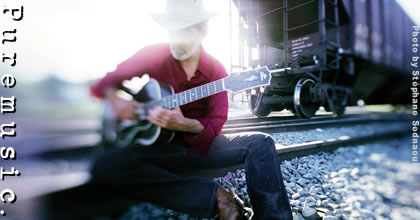
A Conversation with J.J. Cale (continued)
PM: These advance copies that they send journalists never have the credits that you want them to have. Who's playing on To Tulsa and Back?
JJC: Yeah, and I've got on to them about that. Most people don't care, but every once in a while, some of the guys who review the record or listen to it or whatever--and especially guys like me, I want to know who the drummer is, and I want to know what studio they did it in and when did they cut it.
PM: Oh, all about it.
JJC: And on those promo copies they never do that. They just put an old picture on it and the names of the tunes.
There are only six songs that I cut in Tulsa. The other seven tunes are what I call home demos. When I say "home demo," I mean I made them at home, like a lot of this stuff that I've put out through the years.
PM: Right.
JJC: David Teagarden has a studio in Tulsa. And he's a drummer from the old Teagarden & Van Winkle. They had a duo.
PM: You bet.
JJC: He was a drummer. And also he played with Bob Seeger for a long time.
PM: Right.
JJC: Anyway, he was an old crony friend of mine. About three years ago I was going to make another record. So I called up Audie Ashworth there in Nashville. Audie did the first eight albums, I don't know if you know who he is. So me and him were thinking we'd just make a record like we did the old records and get all the guys that are still alive that we used to use back in the 70s and have some fun together like we used to. So we had planned on that, and then Audie passed away.
PM: So sad, yeah.
JJC: Right. And so to make a short story longer, well, I just put the whole thing on hold. And then a gentleman who works for Sanctuary wanted me to--he knew Audie and I were going to do something, and he said, "Why don't you go ahead and make a record, and we'll put it out." And so I decided to do the same thing, only go to Tulsa and use some of my old crony friends that I used to play with when I was growing up, the ones that are still alive. A lot of them are gone. So that's what that was. And David Teagarden has a studio there, and he put it all together for me.
PM: That's great.
JJC: Because he knew where all the guys lived, and this and that, and got them all there on a certain day so we could record.
PM: So who played the bass?
JJC: Bill Raffensperger played bass, and Gary Gilmore played bass, and I also played bass.
PM: Oh, really?
JJC: Yeah.
PM: And there were some keys on the record.
JJC: Walt Richmond. And Rocky Frisco.
PM: Yeah, I've seen some pictures of him. I wondered if he played--
JJC: Yeah. Rocky has been going on the road with me quite a while. Now, Jimmy Karstein is playing drums.
PM: And he's your old guy, right?
JJC: Yeah, he's been going on the road with me for 40 years, so's Rocky, and so's Raffenspeger. And let's see, who else? Don White plays guitar and writes songs. He's playing guitar on it. Christine Lakeland is playing guitar.
PM: Is she playing a lot on this record?
JJC: Yeah, I think she's on almost every cut, the ones I did in Tulsa.
PM: How's she doing?
JJC: She's doing pretty good. She has a little studio and makes home demos and records and stuff, puts out a record every once in a while. She's still kicking.
PM: But she hasn't turned one out since '98 either, has she?
JJC: I don't think so. She don't tell me too much about her career, but I don't think she's made a record since that one. You've probably got a better handle on that than me.
PM: I think I'll have to send her an e-mail. [for the scoop on Christine, visit www.christinelakeland.com]
JJC: Yeah. I'm almost positive she hasn't put out a record here lately.
And that's basically--oh, and Jimmy Markham played harmonica on one tune. So that's basically the rhythm section that it is on those songs. continue
print (pdf) listen to clips puremusic home